“This Side of Paradise”
Written by Nathan Butler and D.C. Fontana
Directed by Ralph Senensky
Season 1, Episode 25
Production episode 6149-25
Original air date: March 2, 1967
Stardate: 3417.3
Captain’s log. The Enterprise arrives at the colony on Omicron Ceti III. The planet is bathed in Berthold rays, a form of radiation that is new to the Federation, so they don’t know its full effects, but extended exposure disintegrates living tissue. It is unlikely that there are any survivors of the colony—led by Elias Sandoval—a likelihood that is increased by the complete lack of response to Uhura’s hails.
However, Kirk beams down a landing party—Spock assures him that limited exposure is safe—including himself, Spock, McCoy, Sulu, DeSalle, and Kelowitz. The settlement is intact, but there’s no sign of any habitation. Kirk waxes rhapsodic on the tragedy of these people travelling all this way, including a year in space to reach the planet, only to die.
And then three people from the colony, including Sandoval, show up alive and well, and doesn’t Kirk feel foolish? Sandoval thinks they came because their subspace radio is on the fritz.
Spock is confused, as Berthold rays are incontrovertibly deadly. McCoy sardonically says that it’s just an educated guess, pure speculation on his part, but his medical opinion is that Sandoval is alive.
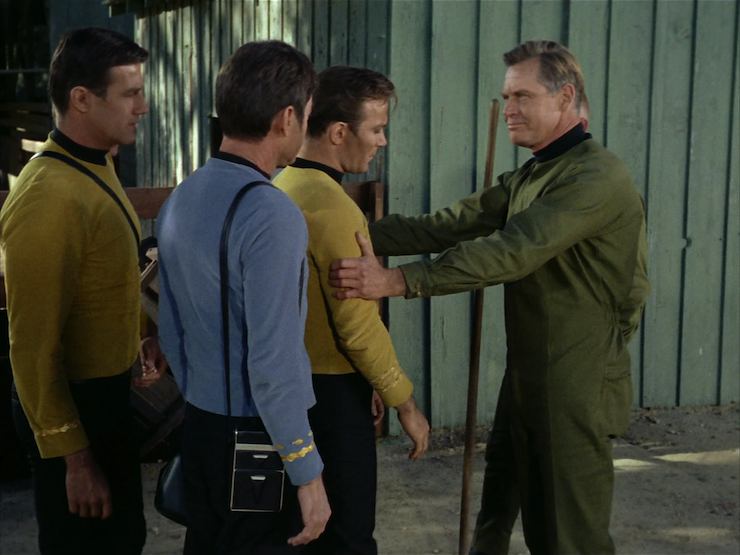
Sandoval leads the landing party to a big house, where they meet Leila Kalomi, their botanist. She and Spock are already acquainted, based on the dewey-eyed look she gives him and the fact that the camera on her is in soft focus (or is slathered in vaseline, it’s hard to tell the difference). Spock, of course, just stares at her impassively. Sandoval is more than happy to let Kirk and the party examine the colony and its people—they have very few mechanical things, no weapons, just a very basic back-to-nature agricultural colony.
Sulu and Kelowitz wander about looking for anything out of the ordinary. Sulu dryly comments that given that what he doesn’t know about farming is a lot, he wouldn’t know out of the ordinary if it was two feet away. However, even he realizes that it’s unusual for there to be no animals whatsoever on a farming colony—no cows, pigs, horses, dogs, nothing.
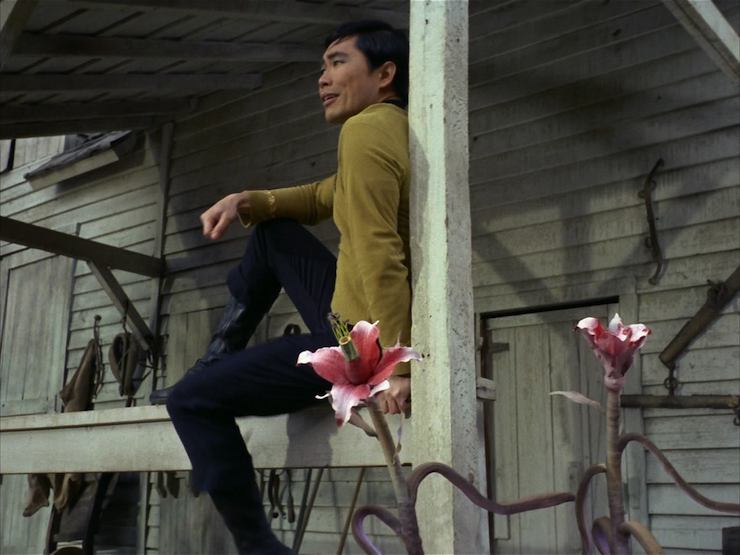
Kalomi tells Sandoval that she met Spock six years ago. He asks if she wants him to stay and become one of them, and Kalomi smiles and says he will whether he wants to or not. Which isn’t at all ominous…
Spock verifies Sulu’s observation: the only non-plant life on the planet are the colonists, which is distressing, since the colony’s original manifest included a passel of animals. DeSalle reports that, while the soil can grow pretty much anything, the colony isn’t growing that much—barely enough to sustain them, with no surplus for emergencies (or, conceivably, for trade).
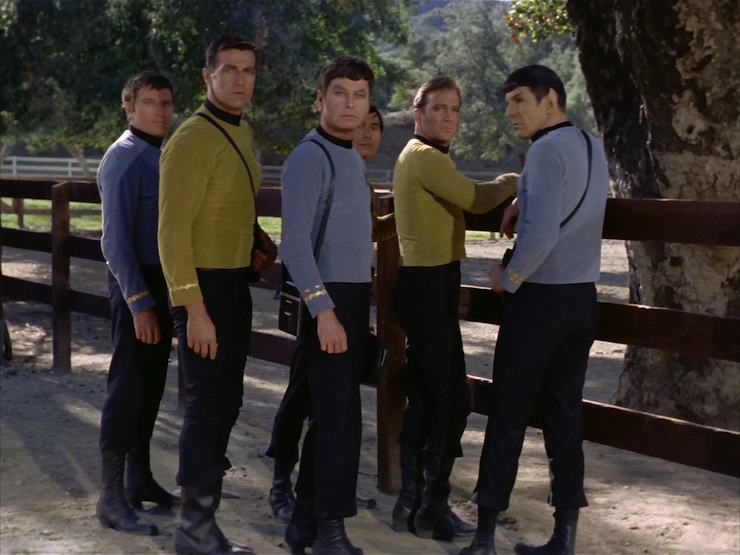
McCoy has the big news, though. His physicals show that all the colonists are in perfect health, across the board, regardless of age. Then he compares his findings with the colony’s medical records—Sandoval has clear lungs and a healthy appendix, but his medical records show scar tissue on his lungs from a childhood ailment and an appendectomy.
Kirk informs Sandoval that he’s under orders to evacuate the colony, but Sandoval refuses to leave. He is also evasive on the subject of the fate of the animals.
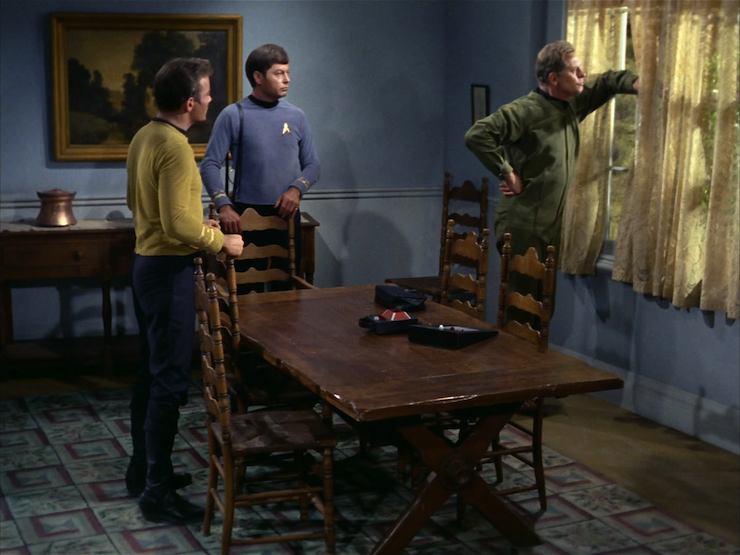
Spock tries to get Kalomi to explain why the planet is so weird, but she only wants to flirt with him. However, she does give in and takes him to a flower, which she says provides peace, love, and happiness. When Spock approaches the hippy-dippy flower in question, he’s showered with spores. He contorts in agony, which surprises Kalomi, as it didn’t hurt anyone else—but after a moment, he’s fine. In fact, he’s better than fine, he’s happy. She says he no longer needs to hide his “inner face” (how she refers to his human half), and he smiles and declares that he loves her.
Kirk orders Sulu to organize landing parties to corral the colonists. He calls Spock, but his first officer has already changed into the pale green overalls favored by the colonists and is lying in the grass with Kalomi admiring the beauty of the clouds. He eventually answers the communicator and disobeys Kirk’s orders to report to him.
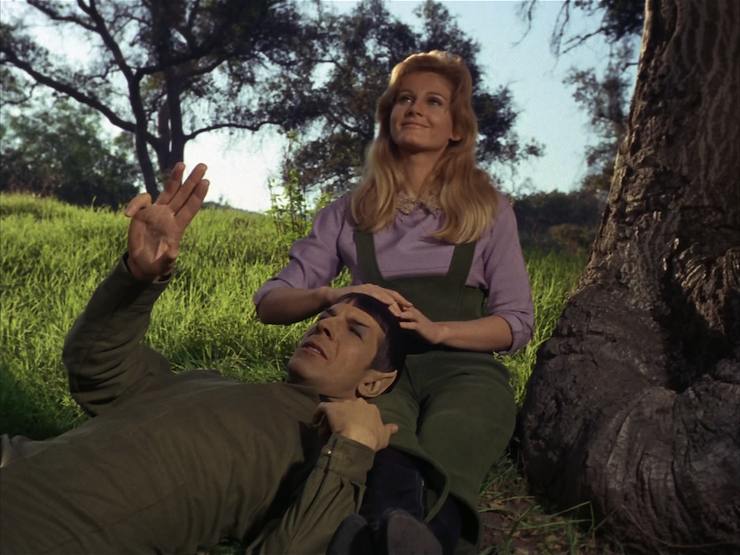
Putting McCoy in charge of the landing parties, Kirk takes Sulu and Kelowitz to find Spock. They track his communicator (which is still open) and they find him hanging from a tree branch and laughing. Angrily, Kirk puts Spock under arrest and into Sulu’s custody until they return to the ship. Spock leads them to some flowers, which spray spores on them. They hit Sulu and Kelowitz, and mostly miss Kirk, who is furious at the fact that Sulu and Kelowitz are now on Spock’s side: they shouldn’t evacuate the colony, it’d be wrong. And hey, look at those rainbows! And have you ever looked at your hand? I mean really looked at your hand?
DeSalle shows McCoy the flowers, and then they beam the flowers to the ship. Kirk angrily beams back up, only to find that Uhura has sabotaged communications except for ship-to-surface. She’s also the only one on the bridge. Kirk stomps down to the transporter room, where there’s a line of crew waiting to beam down. Kirk orders them to return to their stations, and they very calmly refuse. The spores have gotten into the ship’s ventilation system.
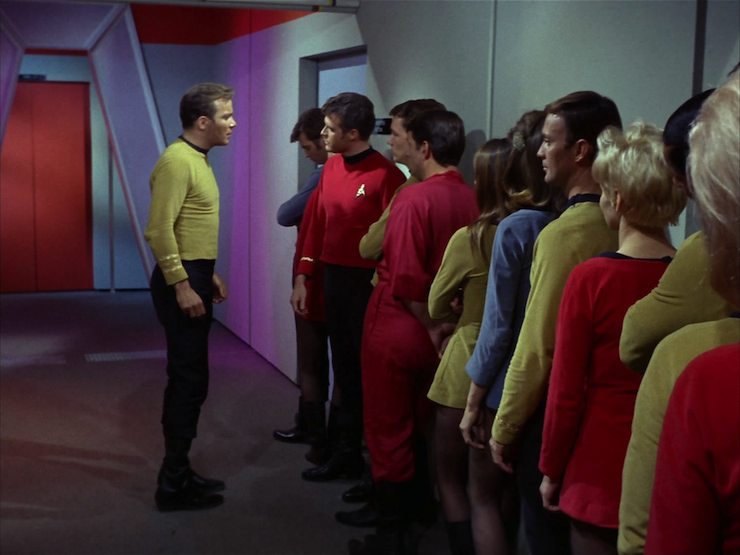
McCoy is too relaxed and happy to try to figure out the physical and psychological effects (which in his case includes talking in an exaggerated drawl). Kirk confronts Sandoval and Spock, who explain that the spores thrive on Berthold rays, and when they inhabit a human host, they provide perfect health and happiness.
Kirk beams back to the ship to find it empty (which raises the question of who beamed him up). He can’t operate the ship alone, so he’s stuck in orbit of the planet. Then he, too, gets hit in the face with the spores, and he contacts Spock, happily saying he’ll beam down after he packs a few things. But seeing his military decorations affects him, and eventually he gets angry again, declaring to the empty transporter room that he can’t leave.
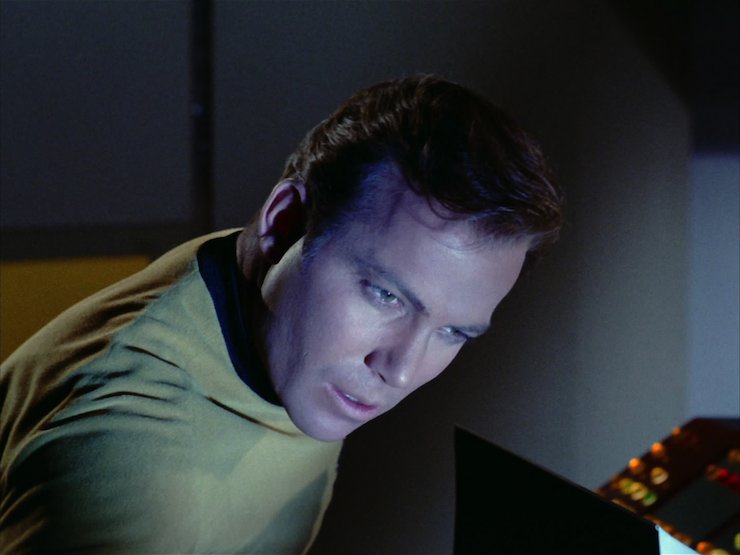
And then he figures it out: the spores make you happy, and they’re neutralized by anger. He convinces Spock to beam up to take care of some things, as the ship will be abandoned once he beams down. When Spock materializes on the transporter platform, Kirk—wielding a pipe—turns into an eight-year-old bully in a schoolyard, calling Spock all kinds of awful names, making fun of Vulcans, then saying Kalomi doesn’t deserve someone who belongs in a circus, not a starship.
Eventually, Spock loses it and beats the shit out of Kirk (trashing the transporter room in the process), and eventually is himself again. However, Spock points out the fallacy of trying to engage 500 crew members and colonists in a brawl. Kirk suggests something a bit more high-tech: a subsonic pulse transmitted through the communications system.
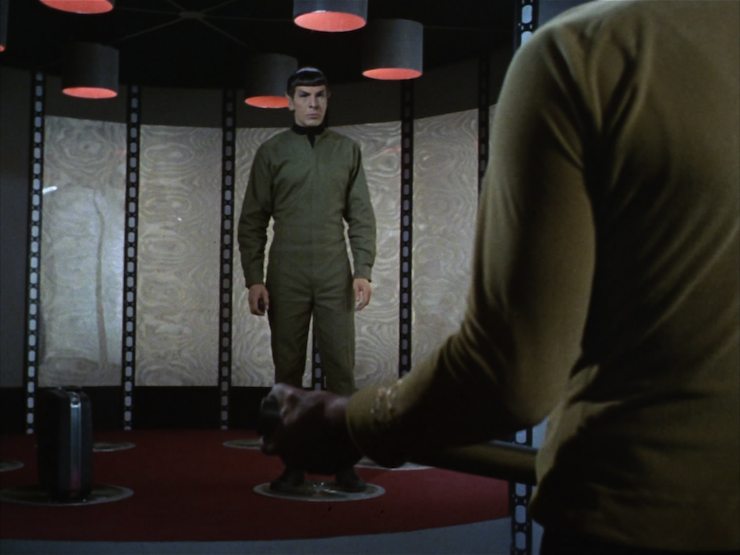
Kalomi is worried about how long Spock is taking, so McCoy calls the ship for her, and she asks to beam up. Spock accedes to her request, and she is devastated to see that he’s back to his old, unemotional self. She begs him to come back with her, as she can’t bear to lose him again, but he refuses—it’s also obvious that it pains him to do so. (She also keeps calling him “Mr. Spock,” which is kind of hilarious.) Her sadness kills the spores in her the same way anger did it for Kirk and Spock.
They set up their pulse, and suddenly tempers flare on the planet. Sulu and DeSalle get into a brawl, as do Sandoval and McCoy. The latter two become clear of the spores, and Sandoval is devastated to realize that his colony has accomplished nothing in three years.
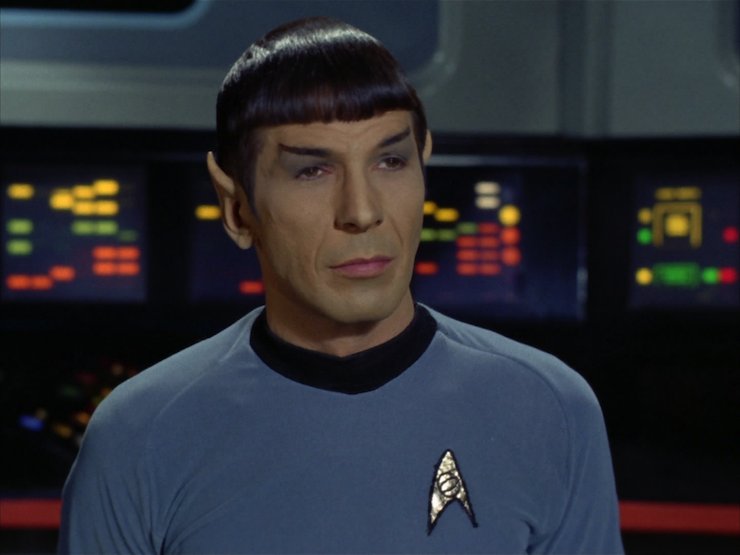
The crew and the colonists are all beamed up, and McCoy reports that they’re still in perfect health—a nice side benefit. Spock laments that this was the first time he was happy.
Can’t we just reverse the polarity? The spores absorb Berthold rays and make you incredibly happy. They also restore their hosts to perfect health, making you wonder why they weren’t used for medicinal purposes going forward.
Fascinating. We get more sexist Spock! “I’ve never understood the female capacity to avoid a direct answer to any question.”
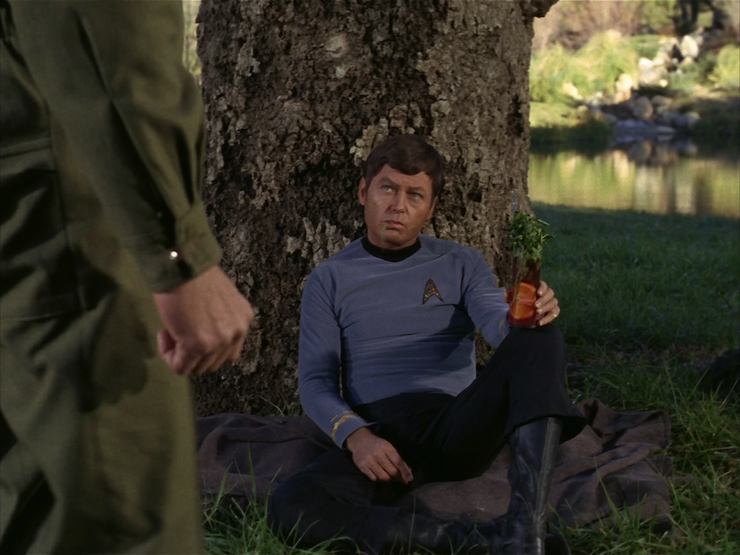
I’m a doctor not an escalator. McCoy talks in an exaggerated Southern accent (and also totally misuses “y’all”) when he’s affected by the spores. We also learn of his fondness for mint juleps.
Ahead warp one, aye. After meeting Sandoval, Sulu asks if he really is alive, proving that he apparently believes in zombies. Or perhaps vampires.
I cannot change the laws of physics! James Doohan doesn’t appear in this episode, but Scotty’s presence is acknowledged when Kirk tries to contact him in engineering.
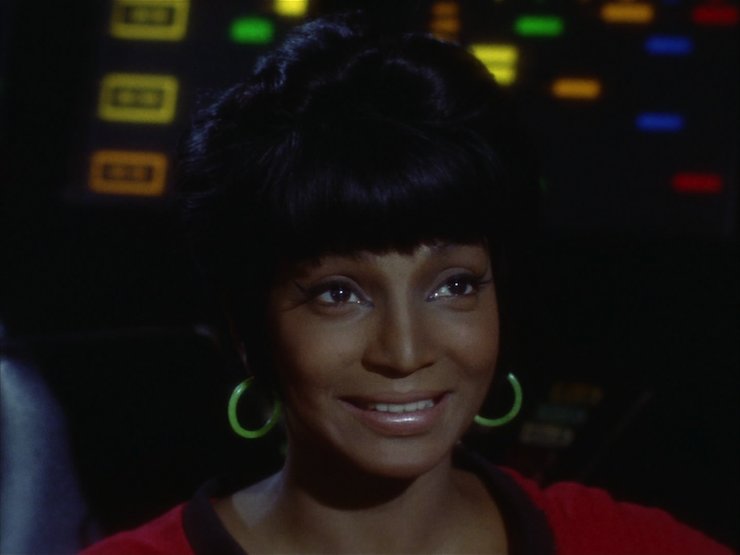
Hailing frequencies open. Under the influence of the spores, Uhura sabotages communications very effectively—and with a sweet smile!
No sex, please, we’re Starfleet. Once he’s been be-spored, Spock changes into civvies and lays on the grass, head in Kalomi’s lap, and picking out animals in the cloud formations. (The only thing missing was Charlie Brown saying he saw a duckie and a horsie. Or, perhaps, Data saying it’s obviously a bunny rabbit…)
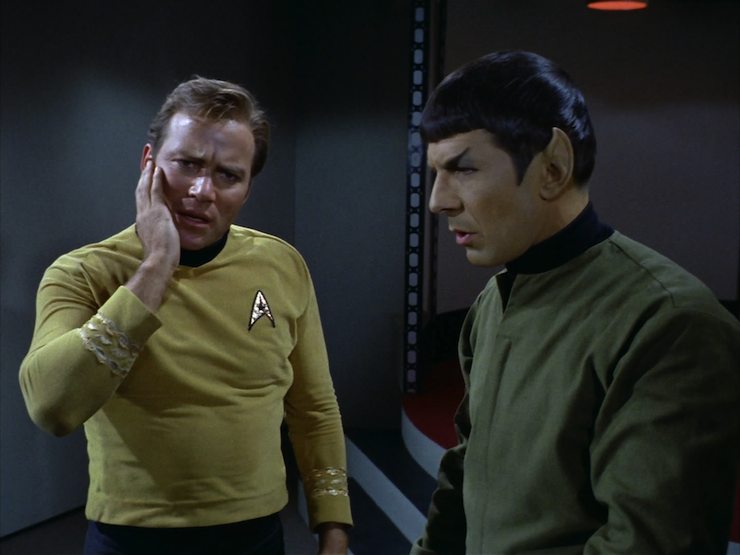
Channel open. “It isn’t every first officer who gets to belt his captain—several times.”
Kirk to Spock after the latter snaps out of it, the former rubbing his aching jaw and holding his aching shoulder as he speaks.
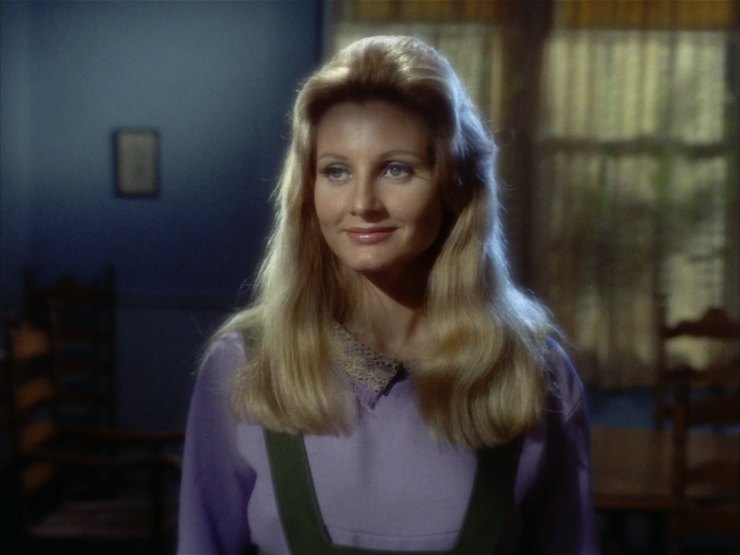
Welcome aboard. Jill Ireland is radiant as Kalomi, while Sandoval winds up being Frank Overton’s final role, as the actor died shortly after filming. Grant Woods makes his third and final speaking appearance as Kelowitz (following “The Galileo Seven” and “Arena“), and the Enterprise crew is filled out by Dick Scotter as Painter (the latest member of the navigator derby), plus recurring regulars Michael Barrier (DeSalle), Eddie Paskey (Leslie), and the usual suspects DeForest Kelley, George Takei, and Nichelle Nichols.
Trivial matters: Nathan Butler was a pseudonym for Jerry Sohl, whose script was heavily rewritten by D.C. Fontana at Gene Roddenberry’s request. In fact, Roddenberry allegedly told Fontana that if she could fix this script, he’d make her story editor, which he later did. Sohl’s original draft had Sulu as the focus.
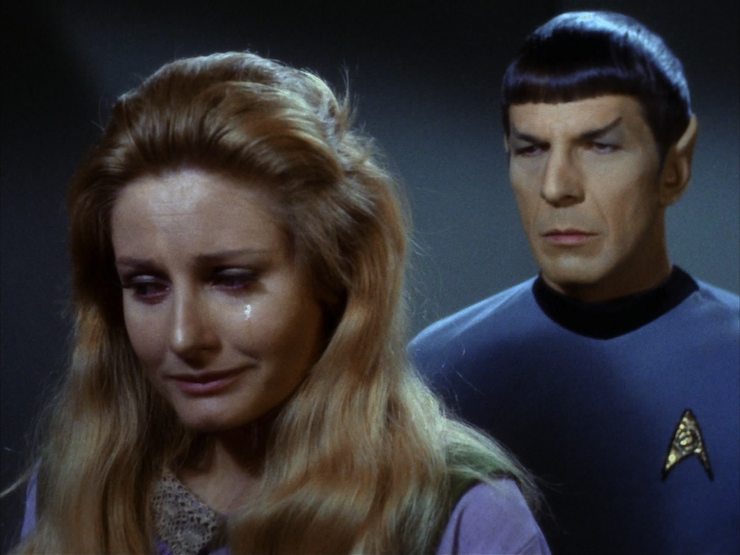
Sohl’s script called for Kalomi to be Eurasian and from Hawaii. So, naturally, they cast her with a blond-haired, blue-eyed Brit…
This episode has the first mention of Admiral Komack, who will eventually be seen in “Amok Time.”
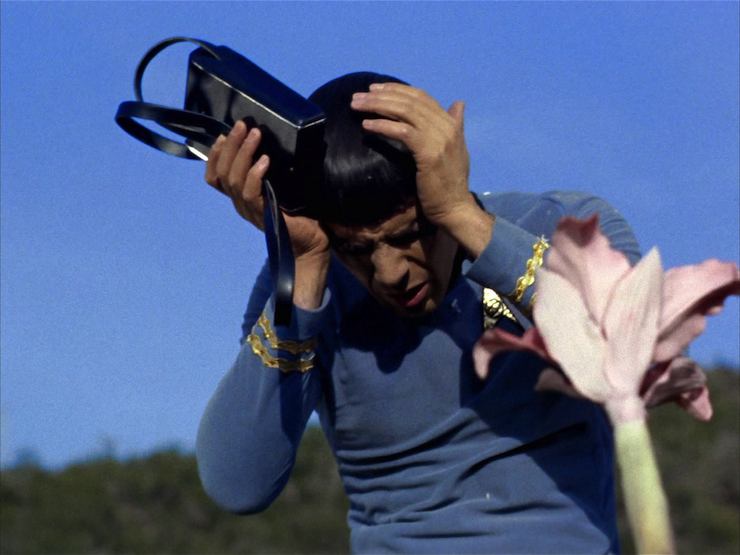
Spock mentions that his mother is a teacher and his father is an ambassador, the first time his parents’ occupations have been stated. We’ll meet his parents in “Journey to Babel,” also written by Fontana, when his father, Ambassador Sarek, comes on board for a diplomatic mission. Spock also reveals that he has another name besides “Spock,” but it’s unpronounceable by humans. Fans and tie-in writers have spent the last five decades coming up with possible names, sometimes to hilarious effect.
The shot of the empty bridge before Kirk walks onto it was used as the blue-screen background for the holodeck re-creation of the Enterprise bridge in the TNG episode “Relics.”
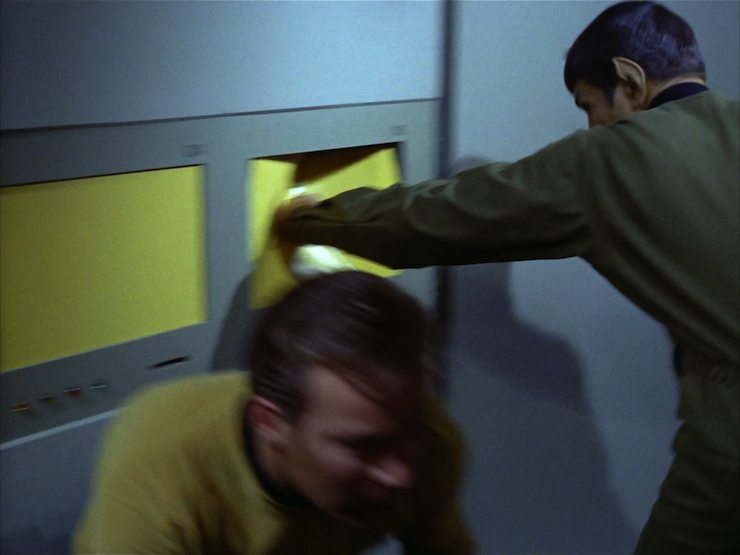
Spock will tell Chekov in “The Tholian Web” that there has never been a mutiny on a starship, which conveniently forgets the mutiny in this very episode.
Berengaria VII (and its dragons) will also be mentioned on the Enterprise episode “Bound,” where the titular ship was investigating putting a starbase on that world. The novel Beneath the Raptor’s Wing by Michael A. Martin establishes that such a starbase was constructed there, and battles occurred there during the Romulan War.
Kalomi’s first meeting with Spock is chronicled in the novel Inception by S.D. Perry & Britta Dennison, which involves not just her and Spock, but also Kirk and Carol Marcus (from The Wrath of Khan). In addition, a poem written by Spock to Kalomi (written by Shirley Meech) called “Sonnet from the Vulcan: Omicron Ceti Three” was published in the 1976 anthology The New Voyages.
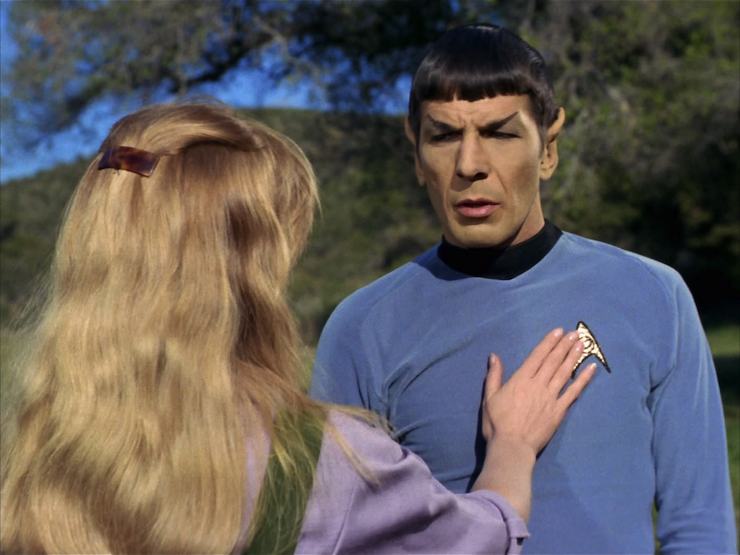
To boldly go. “You’re an overgrown jackrabbit—an elf with a hyperactive thyroid!” This is one of the finest vehicles for Leonard Nimoy the show had provided to this point. The tragedy of Spock’s existence—desperately wanting to be Vulcan, yet with these human emotions just roiling around being suppressed—is on full display here, and Nimoy plays it beautifully. What I particularly admire is the differences among his three sets of interactions with Kalomi. Initially, he’s his usual glacial self, staring blandly at her in the house even as she makes puppy-dog eyes at him while in soft focus. She barely even seems to register on his consciousness as anything other than just another person, and even later in the conversation leading up to her taking him to the spores, his tone with her is no different than it would be with anyone else.
Then, of course, the spores hit, and you gotta think that Nimoy was relieved to actually be able to cut loose while the camera was rolling. The visual of him dangling from a tree branch with a big-ass grin on his face is just magnificent, and so totally alien to what we know of Spock. Even his quick grin in “The Cage“/”The Menagerie” wasn’t as broad and gleeful as the one he mugs with here. He’s completely smitten with Kalomi.
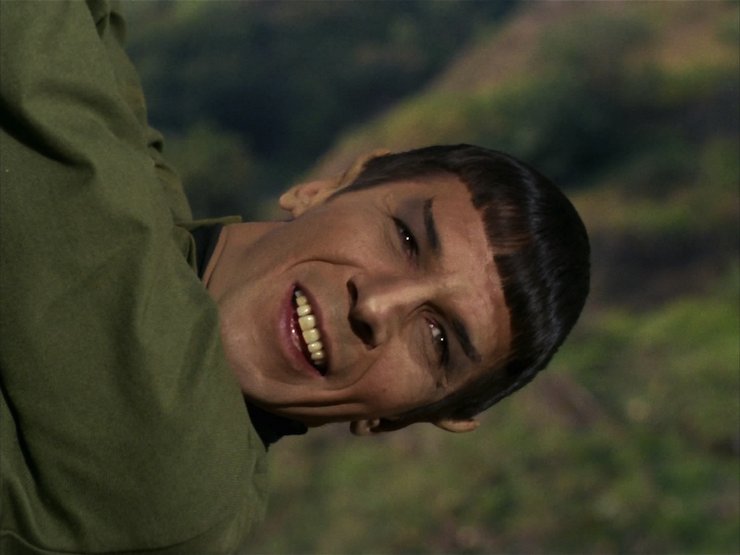
The tour de force, though, is after Kirk snaps him out of it. It would’ve been easy for Nimoy to just revert back to the restrained Spock, but he brings more to it than that. From the moment he stops himself from smashing Kirk in the face with a stool until the episode’s end, there’s a tinge of pain and longing in Nimoy’s tone. It’s obvious in his transporter-room conversation with Kalomi, but we hear it elsewhere when he talks to Kirk. He’s had something wonderful ripped away from him.
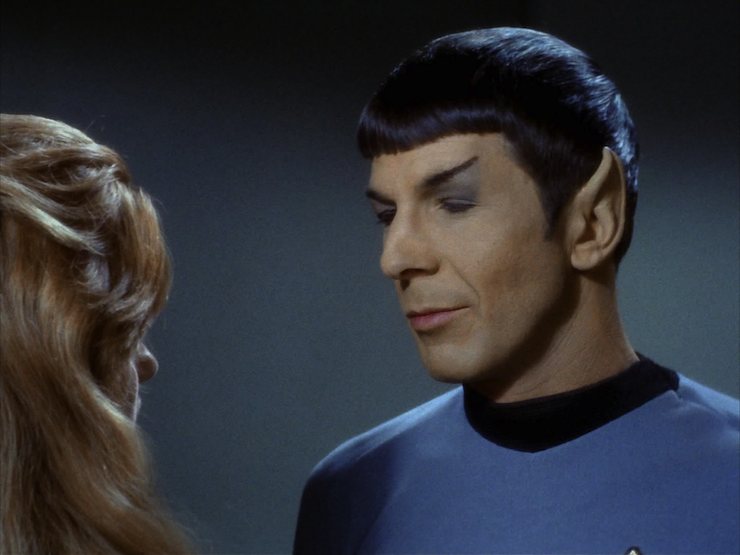
As you watch the episode, it’s easy to think, “Damn, just let them have fun,” but the transformation is too quick—and too mindless. Yes, Spock is experiencing joy, but he’s also not really Spock anymore. Kalomi was in no shape to realize this, being be-spored herself, but while it’s true that Spock could now say “I love you” to her, the things about him that she fell in love with aren’t there anymore. (Well, unless her interest in Spock is purely related to her having a fetish for upswept eyebrows, pointed ears, and bowl cuts…) Although as weird as Spock’s transformation is, McCoy’s is even scarier—not only is that Southern accent awful, but the notion of the good doctor without any curmudgeonliness in him doesn’t bear thinking about…
Warp factor rating: 7
Next week: “The Devil in the Dark”
Keith R.A. DeCandido will be a guest at Dragon Con 2015 over this upcoming Labor Day weekend, where he’ll be doing a reading, an autographing, a practical self-defense workshop, and flipping great wodges of panels. Here’s his full schedule.










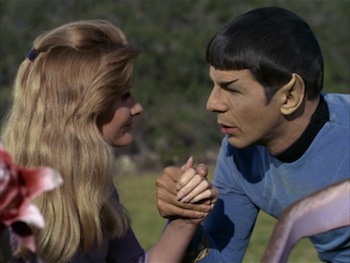
So, why exactly is this only a 7 if you have only kind words for the episode?
This episode is also interesting from a stylistic point ov view. I’ve no comparison data from other 60s shows, but the classical series is apparently cut at a very brisk pace, the follow-up Star Trek series despite being shot 20-30 years later are actually cut slower than TOS. Quite a few TOS episodes go down towards a low 4 seconds average shot range which is not that much slower than the usual blockbuster today which is cut roughly at 3 seconds.
All TOS episodes are within a 4.1 to 6.8 range with one exception and that’s This Side of Paradise which at 8.4 is by far the one episode with the longest takes, using less cross cutting between the characters. If you watch closely you’ll see to which degree Seenesky trusted the actors and built the scenes around them which he repeated in a less radical way in Metamorphosis.
So is this episode where the sex pollen trope comes from?
Not sure that you can call a refusal to obey orders while under the influence of an alien drug and strange radiation a “mutiny.” Certainly, this would be a good defense to court martial charges, which would not likely even be brought. Accordingly, Spock’s later statement was technically accurate.
Typo alert: Multiple instances of “Kolami” when it should be “Kalomi.”
Omicron Ceti is better known as the variable star Mira, which is one of the fastest-moving stars known. It’s a dying red giant with a white dwarf companion, it’s pulsating and sloughing off its outer atmosphere, and it’s pretty much the last place you’d find a habitable planet that looked like the Disney Ranch. Berthold Rays would be the least of their problems.
@2/noblehunter: According to Fanlore, “sex pollen” originated from Poison Ivy.
@5 Thanks. Now I know not everything traces back to the Star Trek fandom :p
This episode works mainly because of Leonard’s excellent performance (the scene where he gets all snarky with Kirk early on is a highlight). I can see why Fontana chose to focus on Spock. The remainder of the crew’s behavior is downright boring.
Plot-wise, there’s really not much to say about this one. Supposedly, Sohl’s original draft had the flowers with their spores located in a far-away cave and that people kept visiting the cave and getting infected, which stretched believability. Fontana rewrote the script to populate the entire planetary surface with them. They’re really no more than a plot device, and I find the execution to be borderline cheesy. Why do the flowers stay quiet most of the time, but decide to spray spores on innocent bystanders when they feel like it? That’s more like an internet troll’s version of a flower.
Otherwise, this mostly works. I like it that Senensky seems to get the love stories. And the music score finally breaks from the repeated stock tunes for a change. I liked Metamorphosis better than this one, though.
Jill Ireland is adorable in the role. I was expecting Keith to point out she kept calling him ‘Mr’. Either she liked to be formal when intimate or someone forgot to revise their final draft.
I also adored Kirk’s reuse of the Half-Breed insult, which he appropriated from What are Little Girls Made Of?. And there can be no doubt that Nimoy’s a better actor than DeForest. I’d forgotten about the atrocious southern accent. Kelley had already lost points with me thanks to his atrocious, yet hilarious singing voice on STV.
#7
Those lost points should go to Shatner, not Kelley, for making the poor man sing in the first place. He’s a doctor, dammit, not Dean Martin.
Lubitsch: as I’ve said many times, the warp factor rating is the least important part of the rewatch. Don’t stress over it. :)
Christopher: good catch, thanks. I went all metathesis on her name, didn’t I? *sigh* They’re all fixed to “Kalomi” now….
—Keith R.A. DeCandido
@7/Eduardo Jencarelli: Actually all the music in this episode is stock. The mushy stuff with Leila is scored with Ruth’s theme from “Shore Leave” (by Gerald Fried), and I think the “Shore Leave” fight music accompanies the fights on the planet at the end. The spore plants’ theme is the Talosian theme from “The Cage” (by Alexander Courage), and the bits where Spock and Kirk are exposed are scored with the opening of the Rigel fortress illusion from “The Cage.” The transporter room fight is scored with music from Joe Tormolen’s freakout scene in “The Naked Time” (also Courage).
I’m not sure how DeForest Kelley’s Southern accent can be “atrocious” when he was actually from Georgia in real life.
@10/Christopher: You got me there. The love theme is the one theme I thought was actually original. I’d forgotten about Shore Leave’s Ruth theme.
I did notice the other themes were indeed stock music, especially the spore plants’ one. They stood out like a sore thumb. It’s one of the reasons I prefer the second season over the first in terms of music variety, even though there’s still a ton of recycling going on.
Christopher: The problem with the accent was that it was way over-exaggerated. Just sounded awful to my ears. I’m fussy about my accents.
—Keith R.A. DeCandido
It makes me love Kelley’s McCoy even more when, under the influence, he turns into Foghorn Leghorn or… Colonel Sanders. Oh, if only he’d worn the white suit and bolo tie.
Spock’s family dynamics are an amazing series of contradictions. The half-human Spock cannot break out of Vulcan conditioning enough to express any feelings toward Leila, yet he can go against Sarek’s wishes that he choose a more Vulcan career path while Sarek is capable of being tender with Amanda. It is tragic to realize that somewhere deep down Spock does love Leila.
I guess Sulu lost interest quickly in botany after “The Man Trap” if he thinks finding anything unusual about the plant life is so completely beyond his knowledge.
The crewman’s puzzled then happy “Yes, it is” to Kirk’s accusation of mutiny cracks me up. And of course, Kirk can cure himself of lotus eating through sheer cussedness because the plants are depriving him of the thing he most wants, command of a starship.
That isn’t what Sulu said, he said he didn’t know anything about farming.
—Keith R.A. DeCandido
So… what did happen to the animals?
#3 @oldfan – That’s exactly what I was thinking. Even though Kirk called it a mutiny before he really understood what happened, the parasitical nature of the spores transforms the hosts to the point where they certainly can’t be held responsible for their actions.
Also, if pointing out that women are much better at creatively finding ways to encourage the critical thinking skills of their conversation partners is the height of 60’s sexism, then maybe that era wasn’t all that bad. ;-)
McCoy is using Hollywood Southern, not real Southern. During that period, Hollywood for TV and movies, and NY for publishing, the South had to appear as a bunch of Yankees and West Coasters thought we were, not as we really were. It was conform or disappear, and frustrating as heck for those of us who were actually born in the South.
I still remember having my pronunciation of the “Appalachian” mountains corrected by a guy from Wisconsin. I told him they were my damn mountains, I live a few hours away, so I damn well knew how to pronounce them correctly.
@16/WarrenB: Implicitly, the animals were killed by the Berthold rays. The spores only seemed interested in taking intelligent hosts, so the animals weren’t protected.
As a Classics nerd, I’d like point out that this episode is obviously inspired by the lotus-eaters in the Odyssey, with Kirk filling the role of Odysseus.
That last line, though, that last line –
Kirk: We haven’t heard much from you about Omicron Ceti 3, Mr. Spock.
Spock: I have little to say about it, Captain. Except that for the first time in my life, I was happy.
<Cut to credits>
I guess I don’t have much to say about this one, except that I remember having a blooper tape where instead of saying “The plants act as a repository” Leonard Nimoy says “The plants act as a suppository…” and they all burst out laughing.
And while trying tolook this up to verify it, I found it was one of the examples on the Wikipedia page for “blooper.”
I see Kalomi’s name as evidence that no one even thinks twice about a woman with a Hawaiian name being a fair skinned blonde. The social implications of that were more radical in some ways than having Spock fall for a non-Caucasian even if the decision may have because the casting was considered “safer” by the standards of the time.
And, OK, just to cover the other implications: What does it mean that Spock has lost his uniform and had to get an entirely new set of clothes? Hmm?
I thought DeForrest was born in Georgia? Yup, Atlanta [went to check]. His Southern accent should have been spot on!
@1. Lubitsch, very interesting details! I’ve noticed that older movies are much “slower” but never thought there is a measure for that. Is there anywhere one can see these values for popular films?
@23/Ellynne: I don’t think it’s really “implications” when Kirk outright says “you’ve got the gall to make love to that girl” during his insult barrage. :P
@26/Idran – While I have no doubt that Spock and Leila enjoyed intimate relations in this episode (see @23/Ellynne’s comment above), the phrase “make love” also has (or at least had) a broader sense, not related to intercourse. Maybe it was the script’s way of saying “have sex” in a way 1960s censors found acceptable, but it can also mean “to pay amorous attention to” – see this post at the Grammarphobia blog for more info.
Since no one else seems to have brought it up, I will: Over at the fine Mission Log podcast, the hosts are constantly returning to this episode, debating whether Kirk did the right thing or not. The gist of their extended argument is this: Since the spores protect the colonists from the Berthold rays, and the colonists are healthy and happy, how is it Starfleet/Kirk’s place to take that away from them? What harm is being done? Indeed, why not study the spores to see how they might protect other colonists from similar radiation in other places? It’s not a reading of the story I subscribe to — but mainly because it was totally new to me when they advanced it. I can’t find too many solid objections to it, other than the obvious, real world explanation that this is a story about (to quote Dr. Boyce from “The Cage”), “living life as it happens to you, meeting it head on and licking it.” These colonists aren’t doing that, I suppose…. but neither are they “withering away and dying” (the only other alternative Boyce considers).
Thoughts?
The scene in the 2009 film where Kirk has to berate Spock into realizing he’s emotionally compromised sort of reminds me of the scene in this episode where Kirk has to provoke Spock. Nimoy’s performance is fantastic, and episodes like this go a long way to showing why Spock resonated so much for so many people.
I’d forgotten the part of this episode where the spores restored their hosts to perfect health — it does seem like they’d be useful for curing illness! Maybe the idea was considered by Starfleet Medical, but they ultimately decided that it was too risky, because if the spores got out of their containment, the entire crew of whatever facility was using them would turn into joy-zombies. Or perhaps it was just seen as impractical because they could only subsist on otherwise dangerous radiation.
-Andy
@28/Andy – Yes, I also thought that connection was one of the best things about ST09.
The rest of your comment goes to the debate about whether the colonists were really all that bad off. “Joy-zombies” — they were at peace, they were happy, they were healthy. I suppose the spores made them give up their individuality or freedom at some level… but they didn’t seem to know they’d lost anything, and look at what they gained. Neither Sandoval nor Leila struck me as zombie-like. I dunno, I just find it an interesting take and wonder what everyone here thinks, too.
@27/MikePoteet: You’re right. At the time, “make love to” meant to sweet-talk, to flirt, to romance, to woo. It later started to be used as a euphemism for “have sex with,” but that’s not how audiences at the time would’ve understood it. The line never would’ve gotten past the NBC censors if it had been seen as a direct reference to sex.
As for the colonists’ way of life, it may seem idyllic, but as stated, they don’t have enough crops for more than bare subsistence, and if anything went wrong, they wouldn’t be able to cope and would probably starve to death or something. Although, given how easy it was to break people out of the spores’ effect when they were troubled, maybe it wouldn’t have precluded them from surviving hardship after all. On the other hand, they might’ve just been so accepting of things that a gradual decline wouldn’t even be noticed and they’d eventually just placidly die out.
Also, what if the spores spread farther? Living peacefully and happily is one thing, but forcing everyone to live the same way is a whole other matter. People should have a choice about it, not just be drugged into compliance. What if the placidity spread across the Federation like a plague? What do you think the Klingons or Romulans would do when they noticed? (Then again, maybe infecting the Klingons or Romulans with the spores could’ve been an effective, nonlethal bioweapon — except the Klingons would probably have been immune, given how angry they are as a matter of course. And there would still be problematical ethical questions.)
@28/AndyHolman: Yeah, when I saw the Kirk-Spock fight scene in the ’09 movie, I expected Chris Pine to say, “Had enough?” I’d be surprised if it wasn’t an intentional homage.
@30/Christopher – Those are some excellent points (as always). You need to chime in over at Mission Log! :)
@27/Mike: When I watched that episode for the first time, when I was in my twenties, that was exactly my reaction – What are they doing?? Those people are happy, they are healthy, they still seem to be individuals, so where’s the problem?
When I watched it for the second time, a couple of months ago, I had totally changed my mind. Obviously, the spores change peoples’ personalities – we see the change in Sandoval. The colonists didn’t go there willingly. And think of the shiny spaceship useless in orbit around the planet – if you have chosen to explore space, you can’t just abandon everything and become farmers; you still have the duty to go on with your job.
That said, I would like the episode better if the reactions to the “rescue” had been more mixed. I would expect some colonists to stay on the planet anyway, this time of their own free will, and some crewmembers to make arrangements to join them as soon as they were allowed to do so.
I think that if the colonists decided they wanted to get back to the spore influence after they realized what happened, Kirk wouldn’t have stopped them. But the fact that they were (at least Sandoval was) horrified to realize they wasted all this time, shows that what Kirk did was right.
@18: I checked out the MCoy scenes, and you (not “y’all,” unless you’ve got a mouse in your pocket) are right. And as a PSA to all y’all on this thread: “y’all” is never singular, despite the existence of the construction “all y’all.” “All y’all” just emphasizes that one is addressing everyone present.
I absolutely love Spock kicking Kirk’s butt. Quite possibly my favorite moments of the series. I also like Bones beating up Sandoval. He was shown to be lacking as a fighter in Bread and Circuses, so it was kind of nice to see that his Starfleet CQC training wasn’t a complete waste.
@34/Majicou: It turns out that in practice, that depends on the southerner, really.
The majority agree with you in practice, but there is a small percent that do use “y’all” in the singular. Though that is specifically a survey conducted in Oklahoma, so maybe it’s more a regional thing.
While some of them had regrets, no one who was freed from the influence of the spores wanted them back. That ought to be enough of an argument. However, if we want details, it seems that everyone under the spore’s influence had to give up core elements of themselves. Spock is the clearest about this, but Sandoval (who I assume had plans and goals when he started as the leader of a colony) is horrified at three years wasted and nothing accomplished. That might have been the reaction of most of them, main parts of the personality that had been repressed coming to the fore.
Anyone know if Joss Whedon has ever cited this episode as inspiration for the Pax gas storyline in Serenity?
If nothing else, this planet would have been a great planet for terminally ill patients to visit. That, or a retirement home. A great planet to end your days on, filled with peace and joy. Not for everybody, of course, but some would definitely love it.
@36: The cited survey and the comments bear out the notion that a majority of Southerners would consider singular “y’all” to be aberrant. Writer Roy Blount, Jr., who is himself from Decatur, GA where DeForest Kelley lived for a time, recounted going into a shop in Texas and the clerk greeting him with “How y’all doin’?” Since Roy had come in alone, he turned around to see if anyone was behind him that the clerk might be addressing, but no one was there. When questioned about this usage, the clerk answered, in essence, that “the tourists expect it.”
@33/salix_caprea and @37/Ellynne — You are right to point to Sandoval’s reaction once he “wakes up” as evidence that the spores aren’t an unalloyed good. I do wonder, though, whether Kirk would have let any colonist go back if she or he wanted to … he’s pretty adamant (despite his use of the word “maybe”) in his closing speech that “we weren’t meant for Paradise.”
I think that, perhaps, was the crux of the argument over on Mission Log. Is life really only worth living if it always involves struggle? Do we accept the premise that we have to fight and scratch our way through every inch of life to be truly human?
Anyway, thanks to all who chimed in… it crops up so regularly on that podcast, I can’t think of this episode without thinking about the argument.
Spock in the tree is one of my favorite Spock moments :).
Can’t wait for The Devil in the Dark next week. It’s my favorite episode!
@@@@@ 25 There’s a page where anyone can measure films, http://www.cinemetrics.lv and there you’ll find the first four STAR TREK series done by me. However there’s no other 60s series done yet, so I can’t say how typical or unusual TOS is for its time. It’s interesting that it’s average shot length is 2 seconds shorter than feature films were around this time. Since the mid 50s the cutting is getting faster and faster and TOS is cut at the speed of an average mid 90s film which however might be a TV thing with all the close ups. The book to read on all technical and stylistic trends, especially the early development of cutting, camera movement and all this stuff is Barry Salt’s Film Style and Technology.
Anyway you can discern even in TV series some directorial styles, e.g. David Livingston is responsible for 6 of the 8 slowest cut STAR TREK episodes.
@@@@@ 29 STAR TREK is often associated with a liberal 60s attitude, but the series is extremely focused on people working and achieving things. TOS shows little patience with stagnant cultures be it Return of the Archons or The Apple or This Side of Paradise and Kirk repeatedly breaks up such stalemates like e.g. in A Taste of Armageddon.
@43/Lubitsch:
I’ve always felt uncomfortable with this episode, and that’s exactly why. Achieving things and living a simple life both can be good things. That’s why I wish that the episode had not only shown Sandoval being horrified, but also some colonists who find that they want to go on living like they did (maybe without mind-controlling spores this time).
I also wish Kirk had focussed on the mind control aspect of the situation in his final speech instead. If he had said something like “It’s a dubious paradise if people’s personalities must be changed to live in it” that would be totally fine (and would make Spock’s final line even sadder). I really dislike the “march to the sound of drums” metaphor, both because it’s too gloomy (working and achieving things can be fun too) and too militant (and that after “The Squire of Gothos” went out of its way to ridicule old European militarism).
Rejecting stagnant cultures in favor of progress seems to be a 60s thing to me, but that doesn’t make it any better.
@41/Mike: I’m not sure if Kirk would have allowed the colonists to return to the spores’ influence, but I like to think that he would have let them live a similar life somewhere else. After all, every now and then he yearns for a simple life himself, so he really should understand such a desire. I also like to imagine that he is ashamed of his pompous speech after hearing Spock’s final line.
@35/Tyler Soze: They probably don’t teach sword fighting in Starfleet combat training. Kirk doesn’t come across as particularly proficient in “The Squire of Gothos”, either. (Of course, he has the additional disadvantage that his opponent can’t really be hit.)
@@@@@Crusader75 & everyone interested in Spock’s family, do yourself a favor and read anything by the great fan fiction writer Pat Foley. The Holography series is the best exploration of Vulcan family dynamics bar none. Just prepare yourself: it gets intense.
Also: I thought Kirk assigning Sulu to look around was actually a subtle continuity nod to his botany hobby (or at least you can read it that way).
Thanks @@@@@MikePoteet and others for pointing out the ethical dilemma that occurred to me for the first time when rewatching this episode. I completely agree that infecting people against their will is wrong (I’m going to assume that Leila’s acting “under the influence” and that she wouldn’t do such a thing without the spores). The crew members are in mutiny (against their wills, possibly, but still) and as such should be despored. But the colonists? It seems like they and the spores are in a mutually beneficial relationship with each other. Perhaps some were infected against their will and should be given the choice, but I’d imagine quite a few people would sign up for such a life (in fact, it seems like a far more hippie ’60s way of living than what Kirk advocates).
I like JanaJansen’s recommendation for a coda to the episode way better than what we got, since it gets to the true heart of the matter (coercion, living in denial) rather than critiquing a way of life that while different, isn’t necessarily wrong according to the Federation (IDIC and all that).
I’m surprised by the perception that the spore-infested colonists were living a valid way of life. Sure, the spores kept them from dying from the Berthold rays, but I think the idea was to portray it as the same kind of trap as Landru’s rule on Beta III — something that looks idyllic and peaceful on the surface but actually takes away free choice and individuality and does not tolerate dissent. Anyone who resisted, who tried to think for oneself, was pressured or tricked by the others into succumbing to the collective against their will. This was tyranny and thought control, no matter how edenic it appeared. Without dissent, without dissatisfaction, there is no growth, no adaptability, no creativity, no freedom. (See also Kirk’s resistance to what Sybok was selling in TFF. “I need my pain.”)
I can definitely see how controlled use of the spores would be medically valuable — infect someone long enough to heal an illness or injury, or to ease an emotional trauma, but then administer an irritant to break them out of the spell. But being totally under the spores’ control your entire life? No way.
@47/Christopher: That’s a good comparison. I, for one, always admired Kirk’s “I need my pain” scene on ST5. It gave Kirk free will. They never spell it out loud (by talking about Kirk’s wrong choices in life), but it’s obvious he was talking about David.
He definitely had every right to refuse Sybok and made the best possible argument, detailing in a very simple sentence why we are human. Humans are born with both pain and happiness. Hell, Pixar’s Inside Out is a masterpiece and a full blown audiovisual class when it comes to detailing the whole concept. One can’t exist without the other, and despite it being a consequence of negative outcomes, sadness isn’t supposed to be a villain. She cares as much about Riley’s well-being as the other emotions did.
How Kirk chooses to deal with that pain is a whole different story, which I feel he’s done pretty well (see Jake Sisko’s entire Visitor and Rapture arcs for the opposite scenario). Definitely one of the bright spots on a flawed film that had enormous potential to be one of Trek’s best.
@47/Christopher: I agree that Kirk did the right thing. What bothers me about the episode is that it mixes up two different ideas, namely (simply put) “free will is good; mind control is bad” and “progress is good; subsistence is bad”.
And I love that scene in TFF you cite. (But then I even like the campfire scene, bad singing and all.)
@44/Jana – That’s a great point about Kirk. Where is the “no beach to walk on…” man we saw earlier this season? I suppose, as with so much in life, it’s a question of balance, and Kirk was in his closing speech simply stressing the “strive” side of the “strive/achieve” tension.
They probably don’t teach sword fighting in Starfleet combat training – Maybe not, given how shocked JJ-verse Kirk is when Sulu tells him his “advanced combat training” is in fencing (that is another moment in ST09 I really love).
@46/Michelle – You’re welcome, but all credit really needs to go to Ken Ray on Mission Log, who refuses to let this ethical issue go. Every time I hear him talk about it, I have to think it through again. (Because, as Christopher says @47, it is kind of surprising. But Ken Ray consistently makes a coherent case, even if one doesn’t end up agreeing. Really worth a listen.)
I wonder if it is easier to dismiss the spores as a valid option when viewing the episode as one adventure among many in the more-or-less consistent Trek universe; and more difficult when viewing it simply as one story (i.e., where there are no questions about ramifications to the larger Federation, etc.)
I think I’d need to see more of the colonists to be convinced that the spores take away all individuality and free will. Apparently they take away the motivation to do anything, but I still say Sandoval and Leila don’t seem like zombies, the way Landru’s folk did.
The analogy to Sybok is a good one, though. But even Sybok isn’t entirely wrong: pain can keep us from moving forward in life, and sharing one’s pain with another is often the best way to move on. Frankly, it’s unclear to me in STV exactly to what extent Sybok is brainwashing people with “Vulcan mysticism” (one of the most amazingly dismissive things a Starfleet officer has ever said, thanks ST III), and to what extent he is “just” taking advantage of their gratitude for his being a therapist of sorts. (And I agree with @48/Eduardo – STV is flawed, but even flawed, it’s better than most folks give it credit for).
@50/MikePoteet: This is the “No beach to walk on” man we saw earlier this season. The reason he lamented not having a beach to walk on is because he understood that his duty didn’t allow him the luxury. I mean, come on, it’s the Federation. There’s no poverty or want anymore, and Earth is a pristine paradise. If he were really determined to go walk on a beach, there’s no shortage of beaches available. Nobody’s stopping him. But he’s chosen a life of striving and challenge and duty instead. He may miss walking on a beach, but the reason he misses it is because he knows that it’s not enough to base his whole life on.
So yes, this is the same Kirk. It’s the same message we’ve been getting since “The Cage” — “A man either lives life as it happens to him, meets it head-on, and licks it, or he turns his back on it and starts to wither away.” The fantasy may be tempting, but it’s not enough. It’s a recurring theme throughout TOS.
And the spores don’t need to take away all free will to be a problem. If they take it away at all, that’s too much. They compel people to try to force the spores on other people. They compelled 429 out of 430 Enterprise crewmembers to betray their oaths and abandon their duties, and almost compelled Kirk as well. Does that sound remotely like free will to you? Every single person in the crew experiencing a complete inversion in their priorities, ending up behaving exactly the same way as the colonists even though it goes completely against everything they believe in? No — no matter how normal they might seem, this is a complete takeover of the personality, a complete destruction of individual will. It’s exactly the same as Landru, just without the Red Hour. Anyone who’s not of the Body is compelled to get in line. The compulsion doesn’t have to be violent to be evil. Gentle, tender force is still force.
@51/Christopher – he’s chosen a life of striving and challenge and duty instead – Yes, you’re right. But does he have the right to make that same choice for the Omicron Ceti III colonists? I mean, I guess spore-ful living isn’t what they signed on for when they left home, so it could be argued (and probably has been above) that Kirk’s simply restoring them to what they wanted: the life of striving and struggle.
Although it could also be argued, like Khan and his people agreeing to Kirk’s sentence, that the Omicron Ceti III colonists, like all colonists, signed on for their mission accepting all risks, even the unknown ones.
Good point about tender force still being force.
I don’t ultimately believe Kirk did the wrong thing (especially where the Enterprise crew is concerned) – but I do think there’s more ambiguity here than I thought there was for decades of rewatching. Thanks for the ongoing conversation.
@52,
You’re basically arguing for the right of people to spend the rest of their lives stoned out of their minds. Which is probably only natural in 2015. I suppose that if the show were being made today, Kirk might have offered them a choice. (Or maybe there is already in analog in TNG with Picard?) “You came out into space to make a difference, and have spent 3 years in a mentally altered state in which you were happy but accomplished nothing and were deprived of even your own basic personality. So, hands up who wants to stay? Everyone else, let’s find you a new planet.”
But that scene isn’t really necessary, particularly in the larger view of the Federation. If the Federation has conquered poverty, and Earth is a paradise, and everyone is guaranteed a certain minimum level of food and shelter regardless of ability or accomplishment, then there are probably thousands of people on Earth who choose to spend their lives drunk or high. There’s really no way around that conclusion, unless you posit a Federation that is fascist/totalitarian and subjects these misfits to forced mental conditioning. They might be herded into special buildings or communities (out of sight, out of mind), but they have to be there. Some aspects of human nature can never be 100% perfected (without forced reeducation or eugenics, that is.)
Given that, we already know that none of the colonists want to live that way, because if they did, they never would have left Earth.
@53/StrongDreams:
While this is probably true for most of the colonists, there may be some who left Earth because they were unhappy for personal reasons and wanted to try something new. Those people might prefer a happy life under the influence of the spores to their original plans. Or, as I suggested above, they might wish to build a similar life for themselves without spore influence. If I were in charge, I would feel uncomfortable to allow them the first option, but would’t have any problems with the second one.
So really, I would expect the colonists to split up into two groups, the ones who want to make a planet a garden and the ones who want to lead a simple, unobtrusive life.
Thank you, Majicou. I have met people who think that Southerners like myself use “y’all” when addressing one person. We don’t. Even if I am speaking to one person, if I say “How are y’all doing” I mean you and your family (or whatever group in the context of my question).
@54/Jana: “So really, I would expect the colonists to split up into two groups, the ones who want to make a planet a garden and the ones who want to lead a simple, unobtrusive life.”
Except, of course, that humans on Omicron Ceti III would die from Berthold radiation in weeks unless they were infected by the spores. That’s why they had to leave at the end. The only way anyone can live on that planet is as a slave. If they wanted to try to build a similar way of life, they’d have to build it on some other world.
I think there’s an angle that’s being overlooked here. We’re all treating the spores like a drug, but they’re actually a life form. And a deleted scene from the original script, also present in the Blish adaptation, makes it clear that they have a degree of consciousness:
SPOCK
The spores themselves are alien, Jim.
They weren’t on the planet when
the other two expeditions were attempted…
that’s why the colonists died.
KIRK
How do you know all this?
SPOCK
They… told us. The spores have a kind
of telepathy, but it’s subtle, almost a feeling…
KIRK
Where did they come from?
SPOCK
Impossible to tell. It was so long ago and so far away…
perhaps the planet does not even exist any longer.
They drifted in space until finally drawn here…
They actually thrive under Berthold rays. The pod plants
are only a repository for thousands of
these microscopic spores until they find a host.
KIRK
What do they need us for?
SPOCK
There are millions upon millions of them, Jim.
They do no harm… but they want a body.
In return they give the host complete health and peace of mind.
Maybe the reason I’m so surprised by the idea that the spores could be benevolent is that I’ve always been as familiar with the Blish version as the aired version, so I didn’t even realize until just now that the explanation of the spores’ semi-sentience wasn’t in the actual episode. As Dave Eversole suggested in the analysis I linked to, it does give the episode more of an Invasion of the Body Snatchers feel. I suppose it could seem more benevolent if you saw the spores as merely an infectious agent.
@56/Christopher: Yes – I meant on some other world. I’m trying to avoid the “subsistence is bad” reading of the episode.
I’d be uncomfortable with sending people back to the spores’ influence even if they were a drug and not a life-form. But you’re right, considering them a life-form makes the whole affair much nastier.
Weighing in here.
The spores are symbionts. And every successful symbiont ensures the survival of its host. In this case, the bare minimum of human survival is sufficient for the spores, so they don’t inspire their hosts to achieve more. They have replaced the hosts’ goals with their own. That is slavery. That is unacceptable. Kirk was right. When choice is denied, it is slavery. Lack of choice is unacceptable.
Hmm does anyone else find it odd that Starfleet/Federation took 3 yrs before investigating why this colony went silent for so long. Don’t they have protocols for colonization of planets? I would think every three months they check up on the planets just as a precaution.
@59/rtms: One of the underlying assumptions of TOS was that space was a vast, largely uncharted frontier and that alien worlds were extremely remote. The writers’ bible specifically cautioned against treating deep space as a local neighborhood, something where any given destination could be easily and routinely reached. Sending a ship to check up on a remote colony world wouldn’t be as simple as sending a social worker to drive out to the suburbs. It’s more akin to the English colonization of North America, when ships took months to reach their destinations and colonies often were left to fend for themselves for years and sometimes did collapse as a result. Like the “lost colony” of Roanoke. The last set of colonists there was settled in 1587, and various circumstances kept a relief expedition from reaching the colony until 1590, when they found it deserted.
For what it’s worth, Omicron Ceti is a fairly distant star, estimated to be about 300 light-years away, though there’s a sizeable uncertainty there (and it was believed to be closer when the episode was written).
I take it The Devil in the Dark rewatch got delayed.
Dragon*Con was this weekend. I kinda figured it would be :)
Happy birthday, Star Trek!!!!!!!!!!!!!
Yes, “The Devil in the Dark” has been delayed. Hopefully tomorrow, maybe Thursday…..
—Keith R.A. DeCandido
@50/MikePoteet: That character’s job in the script is to push back at Kirk’s position as part of a talky dialogue about the issues in the film; but I think “Vulcan Mysticism” is not “mysticism”, pejorative, with the qualifier “Vulcan”: It’s “Vulcan Mysticism,” a known philosophy in that universe. It’s as if he had said “I never understood Buddhism.” His not understanding is why he opposes Kirk’s request for the use of the Enterprise.
I can’t remember the actor’s presentation of the line in the scene well enough, so I could be wrong; but I don’t think it was meant to be ultra-dismissive.
@65/del – Listen to the scene again sometime. I think the actor’s reading of the line “Vulcan mysticism” is not only dismissive but also pejorative. It’s as though he’s saying “mumbo-jumbo.” It’s a heck of a thing to say about a founding race of the Federation.
As ever, though, just my two quatloos!
Hey folks! I dragged a bit doing the rewatch of “The Devil in the Dark” after getting home from Dragon Con, so it won’t go up until tomorrow. I hope it’s worth the wait.
The rewatch of Stargate Universe season 2 should go up Friday as planned.
—Keith R.A. DeCandido
@45/JanaJansen – Fair point, although Kirk did beat those two dandies in “All Our Yesterdays.”
Like Mr. Bennett, I’m surprised that some question the decision to free the people from the spores. Brave New World was a dystopia, y’all.
@@@@@18 – Mbyerly: I feel you. Don’t get me started on “Hollywood Hispanic”. :)
@@@@@ 21 – Eugene R.: That last line is poignant, and at first glance, it makes me sad, but then I realize it doesn’t satisfy me completely. I mean, it’s another iteration of trying to impose Human values on the not Human Spock. Yes, he’s biologically half-human, but culturally, he’s a Vulcan.
Insisting that to be fulfilled, one must be “happy” is imposing human values on an alien culture. I guess that finding a balance between Vulcan logic and Human emotions is desirable… but they keep hammering it on our heads so blatantly, that it bothers me a little.
@@@@@23 – Ellynne: I disagree, I do not find anything socially radical in having a white woman with a Hawaiian name.
@@@@@44 – JanaJansen: I don’t think they’re saying a back to basics agricultural colony is a stagnant culture. Stagnant culture comes when there is no will to innovate or progress at all, it’s not about lasers and gleaming buildings. Progress can be “doing things for myself”, even at low-tech.
@@@@@47 – Chris: I’m with you. I have no idea how can someone even entertain the idea that being under the spores influence could be desirable to a sane person.
@@@@@49 – JanaJansen: They’re not saying “subsistence is bad”. They’re saying the colony wasn’t in any shape to subsist if disaster hit, plus you need to trade to maintain a viable colony in the long term, if only for crop/animal genetics.
@@@@@50 – MikePoteet: I love that Sulu scene in ST 2009.
@@@@@56 – Chris: I didn’t remember the sentience/evilness part from Blish’s adaptation, and I agree with the fact that there’s no way around it: mind control is wrong.
@@@@@58 – nmd: The spores are parasites, not symbiotes.
@69/lordmagnusen: Actually I’d say they are symbionts (“symbiotes” is an inaccurate form of the word coined by Hal Clement in 1950 because he didn’t know the word “symbiont” already existed). A parasite only takes from its host, while a symbiont gives something in return. The spores gave plenty — perfect health, rejuvenation, contentment. It’s just that what they took away is something that it’s unacceptable to lose.
@69/lordmagnusen: Agreed, they don’t say outright that subsistence is bad, but it’s a possible interpretation. I prefer your reading too.
Concerning stagnant cultures, I don’t think there are any in real life. There’s always some degree of change. Of course things are different in the Star Trek universe, with all those computer-controlled societies around.
@71/Jana: Hear, hear. “Stagnation” is little more than an ethnocentric myth used by Industrial-age Europeans to assert their cultural superiority over other civilizations. Those civilizations weren’t stagnant, just stable, with a more gradual rate of change. There’s no single “right” pace for a culture to develop; it depends on circumstances and needs.
@70 – Chris: You know, as I was writing that last comment in a hurry before leaving, I thought “wait, what was the right one, and what was the wrong one? Chris will know…” But you’re right that parasites only take, but the net sum of what these spores give/take is not acceptable.
Coming back to this late, but I figured I would link to Ralph Senensky’s blog where he has a write-up on his experiences filming this episode:
http://senensky.com/this-side-of-paradise/
@66 Indeed, I am in the middle of a Voyager Rewatch and the other day, the Doctor literally referred to Tuvok’s proposed mind meld as “mumbo-jumbo,” indicating that it is still looked upon askance by Earth scientists. Though why the Doctor’s database would not be broad enough to encompass theories of medicine from multiple planets I have no idea.
As far as I’m concerned, this episode is Exhibit A when arguing that Kirk is a complete hypocrite. Sure, he can give pretty speeches about how peace-loving humanity is and get all offended if someone suggests humanity is primitive or warlike… But when faced with a population who is truly at peace, in conflict with neither nature or themselves through nearly perfect symbiosis with their environment, he devotes himself to destroying it while making speeches about how man is meant to fight and struggle for everything. Even if he arguably had the right to force the crew back onto the Enterprise, he whisked the colonists away before any of them had a chance to to re-spore themselves. So now they get to go colonize a planet where they’ll get sick and be miserable and die, like humans should according to the gospel of Jim Kirk.
(Not to mention that he enforces this unilateral decision very shortly after talking Landru to death by accusing him of denying people free will…)
And, of course, Exhibit B would come just a couple episodes later, in “Errand of Mercy,” where he ends up literally on the same side as the Klingon, absolutely outraged that the Organians would dare stop the war from happening. Even at the end of the ep, when he *seems* chastised, his objection actually revolves around how disempowered the Organians made him feel. He never actually conceeds the Organians had any right to meddle in his affairs, even though his entire mission had been to meddle in theirs. Indeed, what they do is basically just a more elegant version of his patronizingly colonialist attitude towards them.
Now, obviously, what this really illustrates is just how confused mid-60s scifi writers were on the topic of the nobility of humanity and such topics, but I find it really incredible researching the show after 50 years and noticing just how primitive Kirk often appears, despite all protests to the contrary.
@76/Jason: As I pointed out before, the script contained lines indicating that the spores were parasitic life forms that were basically enslaving the will of their hosts, though they were cut from the final episode. So it wasn’t inconsistent with other episodes where Kirk defended the right of sentient beings to think for themselves instead of being in thrall to some outside force. And no, it’s not hypocritical to reject a “peace” that comes from enslavement and enforced conformity of thought rather than through our own hard work to master ourselves and respect one another’s differences. It’s obscene to call that being “truly at peace.” Being gelded, stripped of volition, robbed of the ability to disagree with others or to experience negative emotions even when they’re beneficial? Being involuntarily subordinated to the will of a parasite? That’s not peace, it’s domestication.
Even with those lines cut out from the episode, I believe it’s pretty clear that it’s mental slavery.
Nobody seems to want to stay on Omicron Ceti III once the hold of the spores is released. I don’t find this at all surprising, who wants to spend their entire life under the influence? Well probably there are some who would but my guess is those people would not be serving on a Starship or founding colonies. Sandoval’s colonists didn’t go out to a strange world to live like lotus eaters. They had a dream of building a world and creating a new society. The spores didn’t let them do that. Now just maybe some lotus eaters will come along later to settle on Omicron Ceti but not this batch of colonists.
Even Spock, though he sadly speaks of having been happy for the first time in his life doesn’t want to stay. The price is just too high.
My first ever rewatch post, so forgive me for being two and a half years late to the above comments about the music written for this and the rest of the TOS episodes:
I don’t think I’m the only one who feels that the scoring is haunting and evocative, and though dated, adds atmosphere and mystique to the series. The scene from The Cage when Pike is transported to Rigel 7 to face the Killer is a prime example. It’s not just the castle silhouetted against the giant moon (or planet) that evokes awe. It’s the thundering beat played against the mournful, angelic melody in a minor key that transports you to an alien world where you will suffer an unknown fate. Many of those recycled musical bits have that same quality, and as important as the Shatner-Nimoy axis was, I wonder if the TOS would have had the same cultural impact without Alexander Courage, et al’s unique contributions.
@80/Duane: The same composers, and other equally skilled ones, worked for a lot of ’60s TV series and did similarly rich music for them. Really, I think part of the reason TOS’s music became so memorable is because TOS had comparatively few episodes in its syndicated rerun package, so we saw the same episodes and heard the same music cues more often than we would have for many longer-running series. And that let us grow to know them and appreciate them better.
Then again, a number of those other shows went for musical styles that were more period-specific or more minimalist or more experimental, while Star Trek stuck with a more classic and richly melodic orchestral sound, which may have given it greater appeal in the long run. It wasn’t the only show with a rich sound, but that was very probably a factor.
What makes us think the spores’ medicinal properties weren’t exploited later? After all, regrowing an appendix or tonsils seems surprising here, yet almost twenty years later Doctor McCoy goes back to 1986 and gives a woman a pill that grows her a new kidney! Just my $0.02.
Surf Wisely
@82/doLst: Ooh, good catch.
I first watched This Side of Paradise in the early 1970s on WPIX Channel 11 back when I was nine or ten years-old. This was the episode in which I found out that Spock was much stronger than a Terran (I had not seen the Naked Time yet). Nor, had I seen Space Seed. So, when I eventually watched Space Speed some months later, I expected that Spock would get into a fight with Khan and easily defeat Khan with some sort of Vulcan Fu. Boy, was I ever disappointed when the big fight was between Kirk and Khan. So, the boy in me was delighted when, in Star Trek Into Darkness, Spock fought Khan towards the end of the movie. Although, I feel Spock took way too long to kick Khan’s ass.
I thought this one was pretty average and felt very padded. On the one hand, I like how TOS era Trek episodes run longer because there were less commercials when they originally aired. This means if you’re really enjoying an episode you get that much more material. But if you’re not enjoying it then it just feels that much more of a slog. It seemed like Kirk kept going back and forth from the ship to the planet. It makes sense that this episode of TOS in particular had longer shots (less cuts) because it needed those longer shots to fill out the running time. Still, this type of material is great stuff for seeing Spock out of character and Nimoy showing us his acting chops.
Jill Ireland was also radiant but perhaps unintentionally amusing because she comes across as a love-lorn zombie while under the influence of the spores. However, when she comes out of it because of her devastation at not being loved in return by Spock, that was well-played by the actress.
I also enjoyed the bits of humor with Kirk’s interactions with his crew under the spore influence like Uhura and the crewman waiting in line to beam down to the planet. Of course, only the awesomeness of Kirk would lead him to snap out of the control of the spores all on his very own.
I’d give this one a 5.
@85/garreth: Not his awesomeness but his love of his job, and the fact that he was alone on the ship, removed from the general party mood. If his friends had helped him packing, things would have ended differently.
@86/Jana: I don’t think that was it. First-season Kirk was written as an ultraserious, disciplined man dedicated to duty above all, in contrast to the popular stereotype of him as a hormone-crazed womanizer (in fact he was far less so than most of his ’60s action-hero contemporaries). In “Mudd’s Women,” he was the only human male on the ship totally unaffected by the title women’s allure, because he was just so focused on his job. His breakdown in “The Naked Time” was all about how hard it was to be dedicated to duty all the time and suspend his personal needs. He was the ideal captain, married to his ship and his job, always placing duty first as long as he was in his right mind, and able to overcome compromises to his right mind because his dedication to his duty was so overpowering. (See “Elaan of Troyius” later on, where he was able to overcome Elaan’s love-potion tears without a medical antidote because his commitment to the Enterprise and command discipline was so powerful.)
So Kirk resisting the spores wasn’t about being mopey and lonely, and it wasn’t about loving his job, because we know from “The Naked Time” that he saw his job as a demanding mistress, a burden he wished he could be free of. As with “Naked” and “Elaan,” this was a case where his sense of duty and discipline was powerful enough to override his personal feelings and softer desires. He chose responsibility over temptation, as he did consistently throughout TOS.
@87/Christopher: I think both is true. He loved his job and saw it as a burden. It’s a common combination for people with meaningful, but very demanding jobs.
His monologue in “The Naked Time” ends with: “Never lose you. Never.”
@88/Jana: Yes, but my point is that his ability to resist the spores wasn’t just about his feelings. If he’d only cared about his personal feelings, he would’ve abandoned the ship along with everyone else. In the end, his sense of duty and his commitment to command overpowered everything else, as was consistently the case throughout TOS.
@89/Christopher: Okay, I see.
I’ve always enjoyed this episode, and especially liked the sunny outdoor locale shots of the planet. The absolute highlight for me is when Kirk and Sulu are searching for the suddenly AWOL Spock and a smiling Sulu – without uttering a word – points to an incredible sight (that of a laughing Spock hanging upside down from a tree branch). A bit later, after “arresting” Spock, an irate Kirk looks at the branch, which was a nice after-thought. But I never understood why a spore-infested McCoy suddenly starts talking in an exaggerated Southern drawl. Is this the way he really talks? In the “Deadly Years” episode, an aged McCoy again speaks in a heavier Southern accent too!
I love how the camera pans over in the initial possession/kissing scene from Spock and Kalomi to a smug-looking spore plant: “Yeah I did that. You’re welcome.”
About McCoy’s exaggerated accent: as a Southerner it amuses me to no end. This is the kind of accent my friends and I did when we were kids to make fun of how others perceived us. I can imagine the filming of these scenes going something like this:
DIRECTOR: OK, De, that’s take 1. Now do again but this time turn up your accent. Use “y’all” instead of you, drawl it out, call Captain Kirk “Jim Boy,” that sort of thing.
DEFOREST KELLEY: You mean use “y’all” as plural, like when when I’m talking about Captain Kirk and someone else?
DIRECTOR: No, no, use it all the time. Everytime you would say “you” say “y’all.” Sounds more Southern.
KELLEY: Y’ know, I’m from Georgia. We only use “y’all” when it’s plural, you don’t have to use it all the time to sound Southern, why do you want this so exaggerated, anyway?
DIRECTOR: It’ll be funny! It’s what the rest of America expects when they see a Southerner on TV! They think you’re nothing but a bunch of dumb, country bumpkin hicks! Don’t sweat it, it’s not real! You’re just acting! In a show with a guy with pointy ears! Now do the lines!
KELLY: *sigh*
Always enjoyed this episode – but why were they “surprised” to see the colonists on the planet alive and well? Did they not take sensor readings of the planet after assuming orbit? Although the Spock-Leila love story is the central focus here, they should have elaborated more on how these two met on earth and just what their relationship entailed?
@92/moebiusxerxes: I read somewhere once that some Southern people use singular “y’all” outside the South as a sort of deliberate assertion of Southernness, even though they wouldn’t use it that way at home. McCoy was often pretty proud of his Southern heritage, so I can see him choosing to exaggerate it that way.
@93/palash: “Did they not take sensor readings of the planet after assuming orbit?”
Probably an oversight on the writers’ part, but in-story, I would guess that the Berthold radiation may have been interfering with sensors. Although Trek has an unfortunate tendency to forget that “sensors” include telescopes — you could just image the surface from orbit and see people like sufficiently powerful spy satellites can today. (Like, how come their scans of Gideon didn’t reveal its crushing overpopulation?)
@94, “How come their scans of Gideon didn’t reveal its crushing overpopulation?”
In the opening log entry, Kirk says that Gideon denied any surveillance by the ship’s sensors.
@95/BeeGee: “In the opening log entry, Kirk says that Gideon denied any surveillance by the ship’s sensors.”
I know, that’s my whole point — that Star Trek annoyingly fails to realize that “sensors” would include direct visual imaging. Our satellites today can take detailed pictures of the ground. Some of them are sensitive enough to spot individual people on the surface. So why don’t the Enterprise‘s “sensors” include just plain telescopes that could look directly at the surface and see how overcrowded it was? Not to mention that any population so huge would radiate so much heat that it would show up on the ship’s passive infrared sensors with no active scanning required.
Just watched this five episode again and in the opening scene Kirk mentioned the colony had 150 men women and CHILDREN
im afraid to speculate but what happened to the children???
8 years too late, but I couldn’t resist commenting.
I’m watching this entire series for the first time, this episode included. It was only after reading your review that I realised it is a thinly veiled critique of the hippy movement. During my own viewing, I had a feeling when Kirk realised that anger was the solution, that it was a little too convenient and entirely unearned. Understanding why this episode was written in this way, goes some way too understanding why the solution was hamfisted, but not making it any less palatable.
I did enjoy it overall though, Nimoys’ performance standing out in particular
Interesting — I never thought of it that way, but I suppose it could have been. As opposed to “The Way to Eden,” which is a completely unveiled critique of the hippie movement…
Though I suspect it owed at least as much to the Land of the Lotus-Eaters in The Odyssey, and Roddenberry’s recurring theme since “The Cage” that humans need to struggle and challenge themselves rather than retreat into happy passivity.